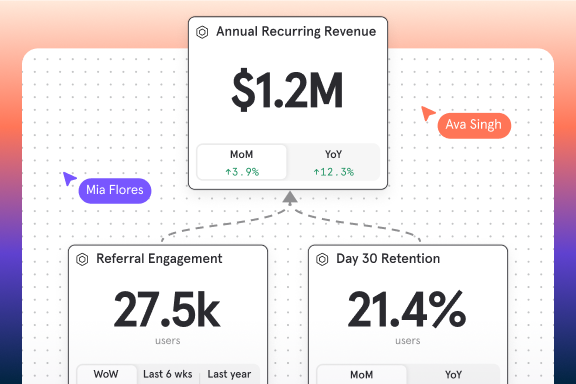How SuperPlay used Mixpanel to build a data-informed culture
Company
Founded in 2019 by gaming industry veterans from Playtika, Rovio, PlayStudios and the film industry, SuperPlay has created a company that delivers world-class, delightful games. After gathering a core team and soft-launching its first game, Dice Dreams, in just six months, the team has grown across the world. Since then, the company has launched a second game, Domino Dreams, and the company continues to expand globally.
Challenge
SuperPlay is one of the fastest growing gaming startups in the world. Its flagship game, Dice Dreams, is a global, top-100 grossing hit, while its upcoming game, Domino Dreams, is on track to follow in its footsteps. The gaming and entertainment industry is a crowded space, with constant competition for consumer eyeballs and attention. Therefore, since day one, SuperPlay has needed to be able to quickly and accurately understand how its users are interacting with their products, quickly debug any issues, understand how new features are performing, and so much more.
Solution
From the day it was founded in 2018, the team recognized that they needed a dedicated product analytics solution, ensuring both product and business teams quickly understand how different types of users engage with SuperPlay’s products, and why specific business outcomes occur. After onboarding Mixpanel, the team has found it far easier to identify issues quickly and validate data from its products, giving them the confidence they needed to make changes and improvements to the product.
We use Mixpanel as our go-to solution for almost everything. It’s powerful and gets results fast. It’s a solution that’s used heavily across different functions, even for those that aren’t data-literate.Shaked Popovich VP of Game Economy and Analysis, SuperPlay
Results
- Achieved a process for day-to-day monitoring, including everything from daily usage of games to financial information
- Enabled non-data people to access metrics that previously data science or data engineering teams would’ve had to provide
- Used Mixpanel Pipeline to transfer data into a data warehouse, ensuring that the data in all BI solutions is the same
How they did it
Why did you choose Mixpanel?
Mixpanel has been with us since day one. And since new employees have joined since the company was founded, it’s never been a case of “I’ve inherited this tool, so I just have to stick with it”. We use Mixpanel because it is fast and agile, but also powerful at the same time. We use other tools like Looker to support data analysis, but no other tool allows us to conduct analytics at the pace and ease of Mixpanel.
What do you use the tool for?
We use Mixpanel for three things. Firstly, we use it for day-to-day monitoring, which can include everything from daily usage of our games to financial information. Secondly, we use it for ad hoc analysis. This can include everything from quickly checking how a new feature is doing, to user drop-off rates, and to general engagement levels.
Finally, we use Mixpanel to conduct A/B testing. For example, this could be when we’ve rolled out new features, and we want to understand how those are performing amongst different user cohorts. It’s vital that we have a tool that can break down users and habits quickly and in a way that is easy to digest for the non-technical user. Mixpanel is the perfect tool for this.
You mentioned that you need to provide analysis and data for non-technical users. So who exactly uses Mixpanel then?
This is the great thing about Mixpanel- it allows anyone to just pick it up and use it. Currently, it is used by a variety of teams, from data engineers, to product, to the R&D team, to marketing and even at the executive level. It means, for example, that the CFO is able to look daily at dashboards related to the monetization across the business, and the General Managers of the studios are able to dive into more depth around product performance, user monetization and so much more.
Tell us more about Mixpanel’s ease of use.
It’s rare for anybody to just pick up an analytics tool and use it without any prior experience in data analysis. But Mixpanel enables a lot of non-data people to access metrics that they would have previously relied on data science or data engineering teams to extract for them. This means there isn’t such a drag on resources across our technical teams, but also democratizes access to key data across the company. For example, when a new employee joins, he can access a few main dashboards we use on daily metrics and very easily understand what is going on there. He can use these learnings to do the same things in a future project.
What else has Mixpanel helped you with?
Without Mixpanel, we would have to hire many more junior analysts to build dashboards and data to conduct daily and basic analysis. But it’s much more than just a time and cost save. For example, we implemented Mixpanel Pipeline as our way of transferring data into our data warehouse, ensuring that the data in all of our BI solutions is the same. With the implementation of Data Pipeline, we added the possibility to get data from solutions that work offline, and previously, in those cases, the data was lost.
What’s next for Superplay, and how do you plan to use Mixpanel?
We will always need a solution like Mixpanel, even as we grow. No matter what size your company is, you will always have a finite amount of technical resources. Having an intuitive tool that anybody can pick up and use immediately takes a weight off our data teams and frees up valuable resources.
Thousands of companies use Mixpanel to build better products. See what Mixpanel can do for your team. Create your free account today.

